- Home
- James David Victor
Challenge of Steel Page 2
Challenge of Steel Read online
Page 2
The body wore an ochre and orange suit—a simple enough, fairly standard design that was a bit on the cheaper side. The suit fit the small pod-like apartment room of Seaview Apartments.
“One of those pay-by-night places,” Anders said out loud to the only other intelligence in the room, Moriarty.
“Easy to check-in, easy to check-out,” Moriarty’s voice buzzed near his ear. Moriarty was a small A.I.—not even a full artificial intelligence, as they had been banned almost two hundred years ago by decree of the Eternal Empress. It was instead what they called a simulated intelligence. It was little more than a personality-interface that overlaid the main crime database of the Military Police Bureau, or MPB.
Anders knew that the exact same ‘Moriarty’ was right now helping probably a dozen other officers of the MPB across the system. He still liked to think that his Moriarty was different, though.
“Scan for ID,” Anders thought aloud as he paced around the body.
There was something odd about the entire scene, and it wasn’t just the fact that the killer had cut the poor guy’s throat and strangled him.
It was the fact that the human head looked kinda, well, young.
The head was completely smooth and hairless—so smooth that Lt. Anders thought the man looked like his hair had been surgically removed.
There was also a certain pudgy quality to the man that suggested much younger years than even he appeared. No creases or wrinkles.
“Which, of course, could be the result of gene therapy. Make a note to check the Database of Allowed Body Enhancement Practices with the Gene Seers,” he said.
“Note taken,” Moriarty chimed from the small silver data-node on Lt. Anders’s lapel. “Scan Results: No ID found. No microchips, no implanted nodes.”
Hmm. Lt. Anders tapped his stubbly chin. It wasn’t completely unusual not to have any physical ID implanted into the body somewhere, if the person was also carrying a data-node or data-pad somewhere on their person.
IDs and data-nodes are the ways that citizens are allowed to live their lives under the Reach of the Throne, Anders thought. An ID was registered to you at birth, and with it, you could get employment, receive gene therapy, pay for housing, etcetera.
“Including, pay for a place like this…” the lieutenant thought aloud. Which was another question: “How did this corpse pay for this room if he didn’t have any form of ID?”
Hell, how did he even get on-world without an ID?
Anders took a closer look at the body for clues. “The poly-filament cord is black, and I’d bet that it’s top industrial-grade work.” Anders reached up to touch it lightly. It was still slightly greasy with the lubricant oil it came packed in.
“Brand new,” he mused.
It wouldn’t be impossible to find cord like that in the shops, he thought, but probably special enough that someone had to go looking for it. Which meant that this wasn’t a crime of passion. The killer had thought about it enough that they had come with the cord already on their person. Climbing, or extreme sports shops, he thought. Another clue to check out—whether any of the local sports shops had sold any recently.
“Nuts.” Anders then realized his mistake.
“The food or the fastener commonly used by mechanics?” Moriarty asked helpfully.
“Either. Both.” Anders groaned. “I just remembered what system I lived in,” he said.
“Always a solid first move,” Moriarty congratulated him.
Lt. Anders knew that the problem with trying to track down the sale of poly-filament rope—and probably even the blade that had cut the poor man-baby’s throat—was that the Hecta System would be full of them.
Hecta was, after all, home to Hecta 3—the terraformed world of the Challenge, and as such, there were any number of outfitters, mercenaries, and extreme sports shops in the system. The merchants and shop owners had long ago realized that visitors and tourists who came to see the Challenge would all want to go home with a souvenir. What better thing than a replica weapon that one of the challengers themselves had used? Or a climbing harness just like the one that some challenger had used to escape the jaws of death?
Anders groaned again. It was almost too much of a coincidence that it would probably take him until the next Challenge to finally track down what outfitter had sold that bit of rope up there.
“Am I to take it that the murder weapon is a dead end, sir?” Moriarty asked.
“Not a dead end, just not top priority,” Anders said. “Let’s work on the body instead…” He took a step closer.
The man-baby remained just as grotesque, and just as ageless, as it had been before. Even the man’s eyebrows were barely there—instead, they were translucent, almost the blonde fluff of a newborn.
Just like…. Ander’s heart clutched at his chest. No. He wouldn’t think of her, not now. Not while he had a job to do.
But memories are unstoppable, and the heart adores defying the mind…
Lt. Anders’s little girl’s name had been Sibbi. Sibbi Corsigon, and she had been ten.
Anders was only nineteen when he had met her mother, Cassandra Y’Letin. They had both been young—Anders already studying to be a military policeman, and Cassandra to be an xenobiologist. They had been young and madly in love, but the pressures of their respective academies had meant that they had to wait for the birth of their first child.
So, they had put the embryo that would become Sibbi into the gene-clinic along with a thousand other would-be and future parents. When they both graduated at twenty-one, they set the date, and Anders had watched Cassandra’s belly swell with pride.
Sibbi Corsigon had been beautiful in every respect. And they had had ten happy—if stressful—years with her before a killer’s bullets had taken both her and Cassandra from him…
“Sir? Sir?” It was the voice of Moriarty, breaking the lieutenant’s dark cycle of thoughts.
“Huh? What… Oh yes, right…” The body. The man-baby. Who looked almost grown, but also not grown in the same breath.
“Check for gene therapies,” Lieutenant Anders said. Why hadn’t he done that in the first place?
“Opening Gene Seer Registry…” Moriarty hummed. “Requesting permission… This will take a few minutes, sir. The satellite servers are very busy, at the moment, with Challenge traffic.”
“Of course. Take what time you need,” Anders said distractedly as he picked up his data-pad, making sure that he had taken enough samples and images in order to satisfy the criminal files. With a couple of clicks, he arranged pickup of the body and a complete scene clearance with the MPB drones—knowing that they would probably be there by the time Moriarty was finished.
This was one of the few benefits of this job, Anders thought. Although there was always a lot of work, it was usually easily solved. As an officer of the MPB, he could be shuttled off anywhere in the Imperial territories, as they were called, but so far, his ‘patch’ was the Hecta System. And the Challenge, unfortunately.
Which meant that he was always doing the sorts of things that he had done just this morning—breaking up fights. A planned homicide like this one was rarer, of course, than the high spirits and crimes of passion that the deathmatch inspired, but he knew that with Moriarty’s help and the full weight of the imperial computer technology, he was sure to catch the killer before nightfall.
At least that was what he thought.
“House Computer?” Anders called out, and the green light came on over the apartment-pod door.
“Officer Corsigon, how may Seaview be of assistance?” the functional computer of the building stated. Again, Anders knew that it wasn’t an A.I., given the restrictions, but it had a simulated personality overlay just like Moriarty.
“Can you give me the payment details for this room please? Name and registration.”
“Cash credit payment. No name given,” the Seaview computer stated.
“Is that even legal?” Anders asked.
“I am not authorized
to process that request, sir…” the computer replied.
“Sir? I can answer that request with my free memory,” Moriarty stated. “Hecta Personal Liability Regulations state that yes, the burden of responsibility lies on the individual—in this case, the tenant rather than the landlord, or Seaview.”
Moriarty was nothing if not helpful, although the news didn’t cheer Anders up at all.
“How about room footage? Do you have internal sensors, Seaview?” Anders asked.
As it turned out, the simple simulated intelligence was about as helpful as a wet sock. “I am afraid that Seaview takes the privacy of its customers very seriously, as according to the Hecta Personal Liability Regulation 3, subsection—”
“Is that a no you won’t hand them over to me, or a no you don’t have them?” Anders growled.
“Seaview has not installed internal sensing equipment of any sort. Only external shuttle-parking cameras, sir…” Seaview not-so-helpfully supplied.
Anders muttered under his breath just as there was a droning sound from the windows.
It was the MPB drones, arriving with the swish-hum of their energy field drives. Anders opened the blinds to see their insect-like bodies attach to the wall, and then slowly crab-crawl up the window. Some electronic conversation must have passed between Seaview and the drones, because the window slid open and the large segmented creatures in steel, black, and gold were scuttling inside. Each one was as large as a human-normal chair.
Anders watched them set to their automated work, carefully emitting laser-lights to measure every conceivable distance as they mapped the room, before a host of tiny metal pods petaled open and for sensors to start taking readings of the air, the bio-chems present, the background and emitted radiation and a hundred other such forensic clues.
Eventually, Anders knew, they would progress to spraying the body with a clear-setting jell that was entirely pH-neutral, which solidified to a hardened rubber consistency. Then they would remove it—scanning where it was attached and making the necessary laser cuts required—and carefully stow it inside the largest MPD drone, before humming back to headquarters.
And where I still have no idea what to do with it! Anders scratched his head. No name, no ID, no identifying marks, no footage of the crime, and searching for the murder tools would be like searching for a needle in a haystack.
“Well, this case is going to be fun!” He rolled his shoulders.
“Request completed,” Moriarty chimed in from Anders’s lapel-node. “I have sent scans and pictures of the body to the Gene Seer Registry.”
“And what’s the result?”
“They have no matching identifiers of the body’s morphology,” Moriarty said.
“What?” Anders didn’t believe it. How could this man, or baby—or whatever he was—not be registered with the Gene Seers? It was obvious that he had been subjected to enough gene therapy treatments to revert his aging process!
And what was the likelihood of him getting his hands on any black-market gene-editing techniques? Anders looked again at the body slowly being coated with transparent goo.
Next to no chance whatsoever, he thought. Everyone knew that the Gene Seers were one of the most powerful pillars of the Golden Throne. The Eternal Empress herself gave them every license, credit note, and research space they could possible want. Their facilities were some of the most fantastically secure sites throughout the empire.
To Lt. Anders, he had no idea what he was looking at, but he was pretty sure that there had to be some powerful people involved. Someone with a personal gene laboratory? Unthinkable, of course, but not impossible. Or someone who could hack the Gene Seer’s Registry?
“I guess I gotta speak to the captain on this one,” Anders groaned as he turned and left the spider-like drones to scuttle over the dead body behind him.
4
Bridge Services
The envoy from Terevesin had chosen the best disguise with which to flee the system—that was, she had chosen to remain herself, although she had added her heavy coat that looked like it was made of stitched hide but was in fact stitched mushroom fabric.
The bridge of Hectamon 7 was, thankfully, just like any other Bridge Service across the Reach of the Throne. That was to say that shuttle-assisted elevators shot up the sides of a massive shining silver and chrome tower, almost to the edges of the mesosphere, and there to travel along hardened cables to the geosynchronous platform known as the ‘bridge.’ It was up here that the various freighters, spacecraft, and shuttles docked, to take the would-be runaway to the next point in her journey across the stars.
Or so she hoped, anyway.
The entire journey up the sides of the tower took little more than a few moments. Field energy systems were now remarkably fast since humanity had discovered that really the only limitation to FTL—faster than light—travel was human comfort.
The envoy—whose name was Mahria U’Losani—had chosen the express shuttle, and of course had the added benefit of state travel. So, she traveled in luxury, sitting in a plush lab-grown leather chair, and had the entire shuttle to herself. Not many people were choosing to leave the system, this close to the Challenge. Even fewer were doing so with such speed.
But Mahria U’Losani, of course, had her reasons. One of them being that she was certain her contact had been overheard saying her home world in the seconds before the assassin’s sniper shot had hit.
‘Terevesin,’ the odd-looking man had been saying, over and over.
Mahria had spent a few hours pretending to be as shocked and traumatized as everyone else. She had volunteered her DNA to the drone-guards, who had requested it of everyone. She had also commiserated and talked in shocked whispers to the other chosen worthies and delegates as their ‘treat’ had been cut abruptly short.
But the woman with frizzy auburn hair and a face like a twenty-five-year old was only too happy to get off that platform.
And get off this damn planet!
The next morning, Mahria had been certain to be seen finishing up her affairs around New Gate City, and she had complained loudly to the Hecta governor that such an attack had completely ruined her taste for the Challenge.
Which is barbaric, anyway, Mahria thought. She had never liked the Challenge, and this was the first one that she had officially come to—despite the invitations. No one had seemed to mind if the small envoy of a small garden world hadn’t arrived. Terevesin wasn’t exactly anywhere near the center of imperial politics.
Which made us the perfect brokers for the information, Mahria thought. Her small world had become known amongst a certain—very elite—circle of dissidents as a place where friendly ears would be found.
What happened to the information that leaked through Terevesin envoys like Mahria, of course, was another matter. She never inquired what it was, entirely, that she was brokering. She had heard rumors from other members of the Garden Council that there had been details of what was included in the upcoming imperial decrees of the Eternal Empress herself.
Or the contents of throne trade deals with the other nations and powers of the galaxy—the Secari, the Ilythian, the Mondrauks, and others…
Or troop movements.
“Stop thinking about it, Mahria!” she scolded herself as she teased at the wavering lines of the vine pendant that eddied and flowed around her neck. It suddenly reacted to something, waving toward the door of the shuttle.
“Stop thinking about what, Envoy U’Losani?” said a voice that shouldn’t have been there.
The voice shouldn’t be there because her express shuttle was traveling at some sixty kilometers-an-hour and hadn’t stopped.
And shouldn’t be there because all state shuttles were code-locked to those within—a small sign of privacy and trust for the elites of the empire.
And shouldn’t be there because Mahria had been entirely alone in the room for her entire journey up to that point.
But now, a patch of shadow and light shimmered from the edges o
f a large potted plant, the green light of the leaves turning into fractals and the silver of the walls darkening, taking on texture as the newcomer shrugged.
“A holo-cloak!” Mahria stammered. She had never seen one in action, and she hadn’t expected to either.
“The very best.” The woman who had been hiding within it smiled. Like the envoy herself, this woman had red hair, but hers was a mess of deep russet curls that draped around her neck and shoulders.
That was where the resemblance ended, however. The rest of the woman was pale where Mahria was tanned, and her skin smooth and toned where the envoy’s was freckled.
She also had startlingly green eyes. Like young aloe vera, Mahria thought.
“One of the perks of who I work for,” the woman said nonchalantly as she made a show of flapping the flimsy material that seemed to shimmer and change according to what was around it. For a dizzying moment, the envoy saw fractals of leaves as it flowed in front of the plant, as well as steel panels where it shook in front of the walls.
Cloaking technology was not a new thing, however—the empire had a way to generate fields that could mask the ships inside—but the idea that these properties could be impregnated into a wearable item as well was at the cutting edge.
“Enough of that now. I didn’t come here to show off,” the woman sighed, bundling the flimsy, maddening material in something the size of her fist and making it disappear in her black clothes.
Black tactical clothes, the envoy thought as she looked.
The woman wore a form-fitting encounter suit, but one that bulged with utility belts and pockets and pouches here and there over her body. Mahria could see the glitter of various nodes, which could be communication, or medical…or whatever this woman appeared to need.
“Who you work for…” Mahria recalled this strange woman’s words, her eyes sliding to the shuttle display behind her.
Arrival in 2 minutes! It read cheerily, completely unaware of the drama playing out inside its metal body.

 Ranger Bayne
Ranger Bayne Valyien Boxed Set 3
Valyien Boxed Set 3 Mimic's Last Stand
Mimic's Last Stand A. I. Uprising (Valyien Book 4)
A. I. Uprising (Valyien Book 4) The Kepler Rescue
The Kepler Rescue Last Stand Boxed Set
Last Stand Boxed Set Challenge of Steel
Challenge of Steel Mimic Saves Her People
Mimic Saves Her People Enemy Within (Jack Forge, Lost Marine Book 7)
Enemy Within (Jack Forge, Lost Marine Book 7)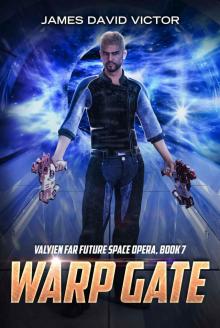 Warp Gate (Valyien Far Future Space Opera Book 7)
Warp Gate (Valyien Far Future Space Opera Book 7) A. I. Apocalypse (Valyien Far Future Space Opera Book 8)
A. I. Apocalypse (Valyien Far Future Space Opera Book 8) Captain Bayne Boxed Set
Captain Bayne Boxed Set Blue Star Marine Boxed Set
Blue Star Marine Boxed Set Night Raiders
Night Raiders Conquest of Earth
Conquest of Earth Betrayal (Jack Forge, Lost Marine Book 6)
Betrayal (Jack Forge, Lost Marine Book 6) Sharpe End
Sharpe End Parallax
Parallax Invasion- Proxima
Invasion- Proxima The Torgoran Revolt (Plundering the Stars Book 3)
The Torgoran Revolt (Plundering the Stars Book 3) Outcast Marines series Boxed Set 2
Outcast Marines series Boxed Set 2 Outcast Marines series Boxed Set
Outcast Marines series Boxed Set Captain Bayne
Captain Bayne Outcasts of Earth (Outcast Marines Book 1)
Outcasts of Earth (Outcast Marines Book 1) Lost Marine
Lost Marine Eternal Enemy
Eternal Enemy Command Code
Command Code Ranger Bayne (The Deep Black Book 3)
Ranger Bayne (The Deep Black Book 3) Mimic: The Space Shifter Chronicles Boxed Set (Books 1 - 9)
Mimic: The Space Shifter Chronicles Boxed Set (Books 1 - 9) The Deep Black Space Opera Boxed Set
The Deep Black Space Opera Boxed Set Federation at War (Blue Star Marines Book 1)
Federation at War (Blue Star Marines Book 1) AI Uprising
AI Uprising The Xarren Escape (Plundering the Stars Book 2)
The Xarren Escape (Plundering the Stars Book 2) Valyien Boxed Set 1
Valyien Boxed Set 1 New Enemy (Jack Forge, Lost Marine Book 4)
New Enemy (Jack Forge, Lost Marine Book 4) Alien Legacy
Alien Legacy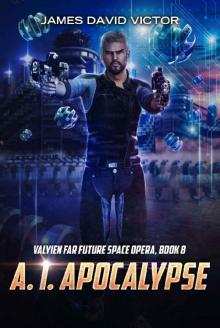 A I Apocalypse
A I Apocalypse Invasion (Blue Star Marines Book 3)
Invasion (Blue Star Marines Book 3) Alliance (Jack Forge, Lost Marine Book 5)
Alliance (Jack Forge, Lost Marine Book 5) Double Sharpe (Raven Sharpe Chronicles Book 2)
Double Sharpe (Raven Sharpe Chronicles Book 2) Metal Warrior: Steel Cage (Mech Fighter Book 6)
Metal Warrior: Steel Cage (Mech Fighter Book 6) Parallax (The Deep Black Book 1)
Parallax (The Deep Black Book 1) Metal Warrior: Steel Curtain (Mech Fighter Book 8)
Metal Warrior: Steel Curtain (Mech Fighter Book 8) Mech Warrior: Born of Steel (Mechanized Infantry Division Book 1)
Mech Warrior: Born of Steel (Mechanized Infantry Division Book 1) Outcast Marines Boxed Set
Outcast Marines Boxed Set Metal Warrior: Ring of Steel (Mech Fighter Book 7)
Metal Warrior: Ring of Steel (Mech Fighter Book 7) The Elarri Heist (Plundering the Stars Book 1)
The Elarri Heist (Plundering the Stars Book 1) Forged Under Siege (Jack Forge, Fleet Marine Book 6)
Forged Under Siege (Jack Forge, Fleet Marine Book 6) Forging a Trap (Jack Forge, Fleet Marine Book 8)
Forging a Trap (Jack Forge, Fleet Marine Book 8) Daikon (ESS Space Marines Book 2)
Daikon (ESS Space Marines Book 2) Mimic Changes the World
Mimic Changes the World Double Sharpe
Double Sharpe Invasion- Pluto
Invasion- Pluto Mimic and the Fight for Freedom (Space Shifter Chronicles Book 3)
Mimic and the Fight for Freedom (Space Shifter Chronicles Book 3) Forged in Battle (Jack Forge, Fleet Marine Book 5)
Forged in Battle (Jack Forge, Fleet Marine Book 5) Lykos (ESS Space Marines Book 6)
Lykos (ESS Space Marines Book 6) Metal Warrior: Precious Metal (Mech Fighter Book 5)
Metal Warrior: Precious Metal (Mech Fighter Book 5) Forged to Hunt
Forged to Hunt Earth Space Service Space Marines Boxed Set
Earth Space Service Space Marines Boxed Set Alpha Rises
Alpha Rises Power of the Seers (Dragon Oracle Book 4)
Power of the Seers (Dragon Oracle Book 4) Forged to Lead (Jack Forge, Fleet Marine Book 3)
Forged to Lead (Jack Forge, Fleet Marine Book 3) Nebula (ESS Space Marines Book 4)
Nebula (ESS Space Marines Book 4) Forged in Darkness
Forged in Darkness Forged in Space
Forged in Space Metal Warrior: Steel Trap (Mech Fighter Book 3)
Metal Warrior: Steel Trap (Mech Fighter Book 3) Mimic and the Space Engineer Boxed Set, Books 1 - 3
Mimic and the Space Engineer Boxed Set, Books 1 - 3 World Breaker Boxed Set (ESS Space Marines Omnibus Book 3)
World Breaker Boxed Set (ESS Space Marines Omnibus Book 3) Forged to Lead
Forged to Lead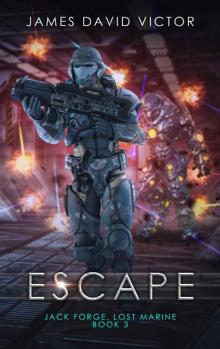 Escape (Jack Forge, Lost Marine Book 3)
Escape (Jack Forge, Lost Marine Book 3) Forged Under Siege
Forged Under Siege Jack Forge, Fleet Marine Boxed Set (Books 1 - 9)
Jack Forge, Fleet Marine Boxed Set (Books 1 - 9) Forged in Darkness (Jack Forge, Fleet Marine Book 4)
Forged in Darkness (Jack Forge, Fleet Marine Book 4) Insurrection
Insurrection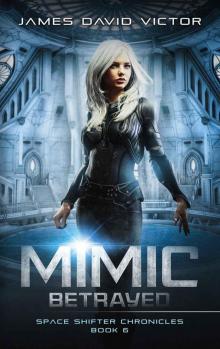 Mimic Betrayed (Space Shifter Chronicles Book 6)
Mimic Betrayed (Space Shifter Chronicles Book 6) Mimic Goes to War (Space Shifter Chronicles Book 5)
Mimic Goes to War (Space Shifter Chronicles Book 5)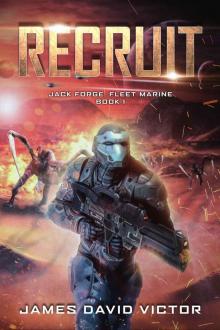 Recruit (Jack Forge, Fleet Marine Book 1)
Recruit (Jack Forge, Fleet Marine Book 1)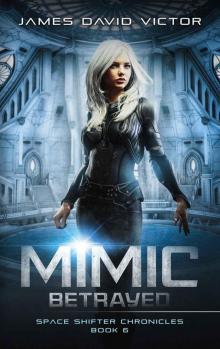 Mimic Betrayed
Mimic Betrayed Power of the Seers
Power of the Seers Mimic and the Journey Home (Space Shifter Chronicles Book 2)
Mimic and the Journey Home (Space Shifter Chronicles Book 2) Mimic and the Space Engineer (Space Shifter Chronicles Book 1)
Mimic and the Space Engineer (Space Shifter Chronicles Book 1)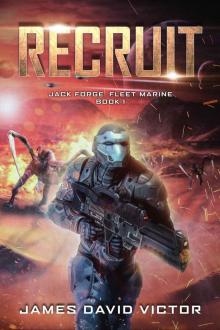 Recruit
Recruit Forged to Hunt (Jack Forge, Fleet Marine Book 7)
Forged to Hunt (Jack Forge, Fleet Marine Book 7) Forged by War (Jack Forge, Fleet Marine Book 9)
Forged by War (Jack Forge, Fleet Marine Book 9) Pursuit (Silver Cane Book 1)
Pursuit (Silver Cane Book 1) Zenith (ESS Space Marines Book 1)
Zenith (ESS Space Marines Book 1) Star Chaser (ESS Space Marines Book 3)
Star Chaser (ESS Space Marines Book 3) Forged in Space (Jack Forge, Fleet Marine Book 2)
Forged in Space (Jack Forge, Fleet Marine Book 2) Defense (Silver Cane Book 2)
Defense (Silver Cane Book 2) Infiltrate (Silver Cane Chronicles Book 3)
Infiltrate (Silver Cane Chronicles Book 3) Alpha Rises (Valyien Book 2)
Alpha Rises (Valyien Book 2) Mimic Raises an Army
Mimic Raises an Army Alien Evolution (Valyien Book 3)
Alien Evolution (Valyien Book 3) Arkana (ESS Space Marines Book 4)
Arkana (ESS Space Marines Book 4) Lykos
Lykos Forging a Trap
Forging a Trap Mimic Goes to War
Mimic Goes to War Earth Space Service Boxed Set: Books 1 - 3 (ESS Space Marines Omnibus)
Earth Space Service Boxed Set: Books 1 - 3 (ESS Space Marines Omnibus) Stranded (ESS Space Marines Book 7)
Stranded (ESS Space Marines Book 7) Mimic Raises an Army (Space Shifter Chronicles Book 4)
Mimic Raises an Army (Space Shifter Chronicles Book 4) Alien Evolution
Alien Evolution